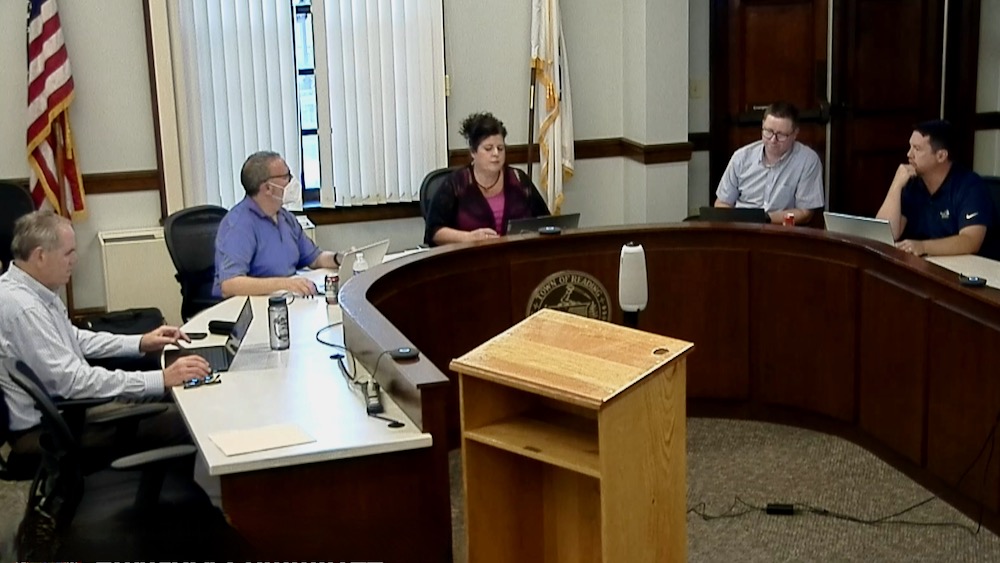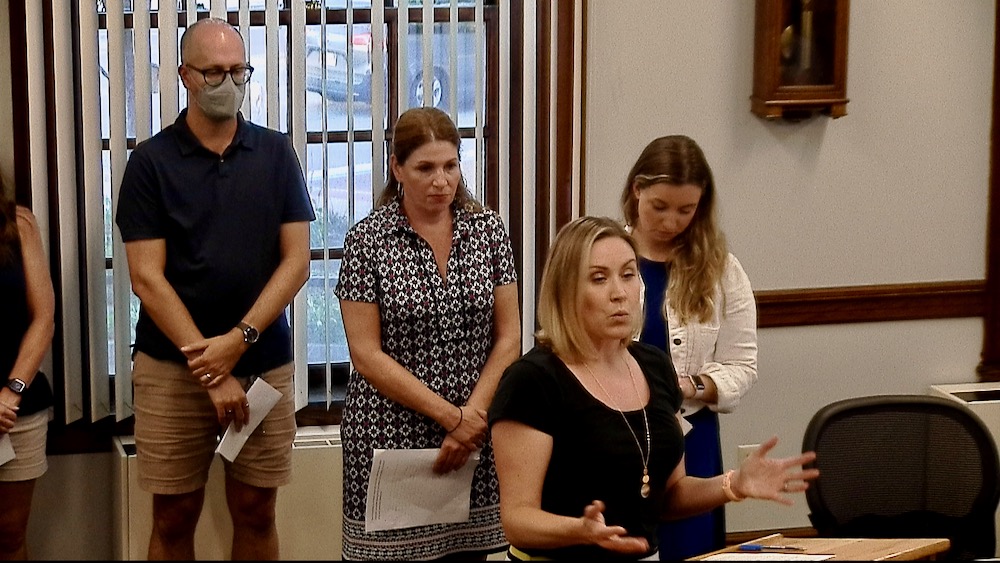
Reading, MA — How to equitably compensate municipal employees for risks taken during the pandemic was the heart of the discussion by the Reading American Rescue Plan Act (ARPA) Advisory Committee (RAAC) on August 3. Reading Teachers Association (RTA) president Jessica Bailey appeared before the RAAC to clarify the experiences of Reading’s teachers during the pandemic.
“The pandemic fundamentally altered what it means to be an educator,” Bailey explained.

Bailey continued, describing the experiences of school nurses, special educators, and regular day teachers in the 385-member union during the unsure days of the early pandemic before vaccines were available. Teachers taught in person, brought equipment and supplies to students, and supplied summer learning in-person, and many had to cancel family and other activities due to possible exposure to the COVID-19 virus. Several other teachers also shared their personal experiences with the committee.
Bailey concluded, asking that all bargaining units in the town be treated equitably when determining compensation for pandemic work. Bailey suggested compensation be based on the number of months worked. RAAC member Shawn Brandt stated that he liked the approach of the RTA as it seemed a simple way to assess who should receive compensation. “If you worked in person, you get compensated,” Brandt suggested. RAAC member Thomas Wise suggested that assessing risk fairly was more complex, but maybe a more straightforward approach was needed. However, he still advocated for a slightly more complex equation than suggested by the RTA.
The 155-member Reading Para-Educators union offered a similar request as the RTA. Union treasurer Gail Caiazza suggested, “Bringing back our most vulnerable students could not have happened without paras, especially as substitutes became extinct.” The Reading Administrators and Secretaries union also advocated for equitably distributed compensation.
Other groups also appeared before the committee to update their requests. Jennifer Rodgers, president of the Reading/North Reading Chamber of Commerce, shared that the Chamber’s request has been adjusted to reflect some recently secured state funding. The Chamber is asking for $15,000 to support memberships for businesses that have not renewed because of the pandemic. It is asking for $10,000 for a “Shop the Readings” outreach campaign. It also asks for $4,000 for signs and banners to direct people to local businesses during downtown construction. RAAC chair Maryanne Downing asked how to be sure that Reading ARPA funds will be used to support Reading businesses. Rodgers shared that North Reading has committed $8,900 to the outreach campaign, though not through the use of its ARPA funds.
Chuck Webberly from Reading Youth Lacrosse presented a request for $150,000 to be used to construct a lacrosse wall in the Birch Meadow Area. Space is allocated for a wall as a part of the Birch Meadow master plan. Webberly shared that a practice wall would help enhance the skills of lacrosse players in town and suggested that athletes in other sports, such as soccer, could benefit from it as well.
Reading Food Pantry board member Vanessa Alvarado also presented an amended request to the committee. The food pantry requests $12,000 for two industrial refrigerators, $57,000 for gift cards, and $15,000 to hire a space needs consultant. Alvarado explained that space at the food pantry had become an issue on multiple fronts, not the least of which is that the current space, located in the Old South United Methodist Church, is not considered accessible to those with physical disabilities. When asked about the amount for the gift cards, Alvarado explained that increasing food prices had created a higher need for the cards. The plan is to use the funds to supplement the cards for three years. “Three years provides that consistent support for food security,” Alvarado advised.
After these final requests were made, the committee launched into a discussion on how to prioritize the remaining funds in order to make a presentation to the Select Board. The conversation began with a proposal from committee member Mark Dockser to think about $1,000,000 in funding for a senior center as well as $500,000 for affordable housing. While recognizing the need, Downing pointed out that $900,000 had already been committed to seniors and that the survey results overwhelmingly supported enhancing recreation spaces. Wise expressed concern that ARPA funds should be for something tangible and that the funds could not just be saved in the Affordable Housing Trust Fund.
The conversation soon drifted back to compensation pay for municipal employees. While acknowledging the risks taken by members of town staff during the pandemic, RAAC member Joseph McDonough expressed the opinion that many persons in the private sector had also faced similar issues and had not been compensated. Brandt countered, “[We have] a moral imperative to recognize service of town employees, more than a token recognition.” Wise agreed, restating his belief that a formula to distribute compensation fairly needed to be created in the name of equity. After some back and forth, Brandt and Wise were assigned to develop a plan to compensate employees for their service during the pandemic equitably. The committee as a whole will review the plan at its next meeting.
The RAAC adjourned at 11:15pm.
